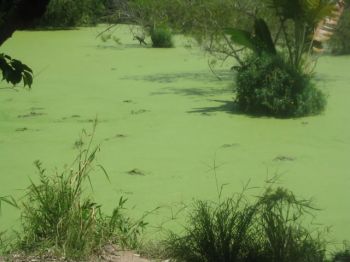 Well, not quite, but NASA is throwing its weight behind research to develop algae biofuel.
Well, not quite, but NASA is throwing its weight behind research to develop algae biofuel.
According to Fox News, NASA is looking into ways to grow algae in wastewater to be converted into biofuel. It has developed a system called OMEGA, which stands for ‘offshore membrane enclosures for growing algae’. The system “consists of algae grown in flexible plastic bags floating offshore where cities typically dump their wastewaterâ€.
The bags were developed by NASA to recycle astronauts’ wastewater on missions. They are semi permeable membranes that let freshwater out but keep saltwater from entering. The bags would float on the ocean, collecting solar energy while the algae inside generate oxygen via photosynthesis, feeding off nutrients in the sewage and growing fatty cells. The bag absorbs carbon dioxide from the air and release oxygen and fresh water. The heat capacity of the ocean would control the temperature and waves would keep the system mixed and active.
The beauty of the process is that, at the end of it, biofuel is produced and sewage is processed, so we get two green jobs done in one fell swoop. Jonathan Trent, a bioengineer at NASA Ames Research Center, says that even if the bag leaks, it won’t contaminate the surrounding environment while enclosed fresh water algae will die in the ocean. He’s working on making the bag biodegradable.
Algae biofuel is seen as one of the most exciting and cleanest types of biofuel. Its yield range is higher than other types of biofuel (1,000 – 4,000 gallons per acre. Others such as oil palm, sunflower and soybeans yield a few hundreds). The U.S. Department of Energy (DOE) believes algae could meet fuel demands for the country’s entire transport network and has invested in algae-focused projects through its funding agency, ARPA-E.
We’ll be covering more algae-related stories for sure so watch this space for more.

![Reblog this post [with Zemanta]](https://img.zemanta.com/reblog_e.png?x-id=159655c1-9a19-4dc5-88c6-63918c49ad6c)




